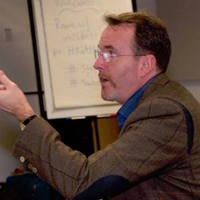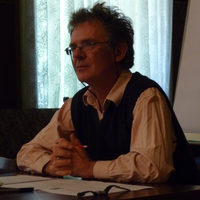
Abubakar Zaria IBRAHIM
Abubakar Zaria IBRAHIM was born in Limanci Kona ward of Zaria city in 1965. He attended Kofar Kuyambana LEA Primary School (1972-1978), Alhudahuda College, Zaria (1978-1983) and College of Advanced Studies, Zaria (1984-1986). His academic career started in 2004 when the Department of History, Ahmadu Bello University, Zaria engaged his service during his M.A. studies.
Studying history at first degree exposed him to the realities of civilisations and the processes of state formation. The Eurocentric propaganda that societies which had no art of writing had no history became objectionable to him through the various undergraduate lectures. This exposure made him interested in various sources of history and he began with choosing to write his final year long essay on the significance of oral sources in the reconstruction of Nigerian history in the 20th century. An essay he improved in later years and published. Till date, the article continues to attract the attention of scholars internationally.
When he registered for M.A. studies his research attached much importance to written sources. He came across Arabic manuscripts in the area of research, which was Shika area of Zaria emirate, a cluster of settlements that had rich presence of Islamic scholars who in one way or the other were related to the Sokoto caliphate scholars of the 19th century. After locating Arabic manuscripts in the area, he applied for a research grant from the Ford Foundation Office for West Africa to write a report on the area and it was granted to me in 2009. The research widened his perspective on Arabic manuscripts, especially those inherited from the Sokoto caliphate scholars. Thus, after concluding the Ford Foundation work, he developed and published an article titled ‘Gungurfa Arabic Manuscripts: Materials for Historical Reconstruction’ which was published in 2012 in Zahir, a journal of the Department of History, ABU Zaria. His exposure to Arabic manuscripts, especially that had to do with the Sokoto caliphate scholars, made him develop a wider interest on the Sokoto intellectuals and their writings. As a result, when the Department of Philosophy was established in ABU and he was chosen to be among the pioneer staff, he decided to direct his PhD in Philosophy research towards the ethical ideas of the Sokoto caliphate scholars. After conducting a bench research at the University of Warsaw, Poland, in 2017 Abubakar came back to set a historic record of graduating as the first PhD in Philosophy in Ahmadu Bello University Zaria.
Dr. Abubakar has attended twelve international and local conferences and seminars, published nine academic articles and co-authored three books. He currently engages in intellectual debates with western oriented philosophers who have no information about the rich philosophical materials on ethics, logic, epistemology, metaphysics and politics of the Sokoto caliphate scholars.
Supervisors: Dr Dipo Fashina and Pro. Alloy S. Ihuah
Studying history at first degree exposed him to the realities of civilisations and the processes of state formation. The Eurocentric propaganda that societies which had no art of writing had no history became objectionable to him through the various undergraduate lectures. This exposure made him interested in various sources of history and he began with choosing to write his final year long essay on the significance of oral sources in the reconstruction of Nigerian history in the 20th century. An essay he improved in later years and published. Till date, the article continues to attract the attention of scholars internationally.
When he registered for M.A. studies his research attached much importance to written sources. He came across Arabic manuscripts in the area of research, which was Shika area of Zaria emirate, a cluster of settlements that had rich presence of Islamic scholars who in one way or the other were related to the Sokoto caliphate scholars of the 19th century. After locating Arabic manuscripts in the area, he applied for a research grant from the Ford Foundation Office for West Africa to write a report on the area and it was granted to me in 2009. The research widened his perspective on Arabic manuscripts, especially those inherited from the Sokoto caliphate scholars. Thus, after concluding the Ford Foundation work, he developed and published an article titled ‘Gungurfa Arabic Manuscripts: Materials for Historical Reconstruction’ which was published in 2012 in Zahir, a journal of the Department of History, ABU Zaria. His exposure to Arabic manuscripts, especially that had to do with the Sokoto caliphate scholars, made him develop a wider interest on the Sokoto intellectuals and their writings. As a result, when the Department of Philosophy was established in ABU and he was chosen to be among the pioneer staff, he decided to direct his PhD in Philosophy research towards the ethical ideas of the Sokoto caliphate scholars. After conducting a bench research at the University of Warsaw, Poland, in 2017 Abubakar came back to set a historic record of graduating as the first PhD in Philosophy in Ahmadu Bello University Zaria.
Dr. Abubakar has attended twelve international and local conferences and seminars, published nine academic articles and co-authored three books. He currently engages in intellectual debates with western oriented philosophers who have no information about the rich philosophical materials on ethics, logic, epistemology, metaphysics and politics of the Sokoto caliphate scholars.
Supervisors: Dr Dipo Fashina and Pro. Alloy S. Ihuah
less
Related Authors
Daniel D. Hutto
University of Wollongong
Galen Strawson
The University of Texas at Austin
Andreas Umland
National University of "Kyiv-Mohyla Academy"
Thom Brooks
Durham University
Richard Bellamy
University College London
Timothy Williamson
University of Oxford
Shaun Gallagher
University of Memphis
Armando Marques-Guedes
UNL - New University of Lisbon
Elena Loizidou
Birkbeck College, University of London
Andrew W Wilkins
Goldsmiths, University of London










Uploads
Thesis Chapters by Abubakar Zaria IBRAHIM
By
IBRAHIM, Abubakar Zaria
P13ARPH9001
A Thesis submitted to the School of Postgraduate Studies, Ahmadu Bello University, Zaria, Nigeria in partial fulfilment of the requirement for the award of Doctorate Degree in Philosophy, Department of Philosophy Ahmadu Bello University, Zaria-Nigeria
2017
ABSTRACT
History of ethics and political thought shows that Western philosophers formulated ethical theories such as egoism, virtue, deontology, contractualism and, utilitarianism and illustrated how these are applicable in benefitting individuals and societies in building a complete moral life. The large amount of the work done in the area concentrated on non-African societies. This constitutes our problem of investigation in this research. Interestingly, there existed some societies that had little or no contact with the West but which have also developed morally acceptable ideas of living. Such are, for example, the Muslims that have established kingdoms and empires all over Asia, Middle East, part of Europe in Spain and Africa. The ethical principles these societies developed may be what we can call a ‘divine command theory’, which of course also exists in the West. It is a theory which follows religious beliefs and sources. The Muslims, who practice the religion of Islam, have intellectuals, scholars and thinkers whom were philosophically inclined. The objective of this dissertation, titled “Utilitarianism and Islamic Divine Ethics of the Sokoto Caliphate Scholars: A Hermeneutic Interpretation” therefore, is to examine the ethical ideas of virtue, good government, justice, righteousness and obligation from the perspective of Jeremy Bentham, James Stuart Mill, and Henry Sidgwick, and the Sokoto Caliphate scholars, especially the triumvirates of Uthman ibn Fodiye, Abdullahi ibn Fodiye and Sultan Muhammad Bello. The research is purely theoretical, not empirical. As such its methodological framework is based on hermeneutics, a philosophical method aimed at interpretation of texts, social, cultural, psychological and historical world. Resultantly, it found that though there are some similarities between the utilitarians and the Sokoto Caliphate scholars, there are also differences. They are all influenced by existing morality and the problems that arise within morality because our day-to-day activities and the values we use to govern them are constantly presenting us with new questions for the philosophical discipline of ethics to investigate. But while the utilitarian ethics prepares man for the morality that concerns this world, the divine command theory of not only particularly the Sokoto Caliphate Scholars or Islam, but other religions as well, prepares him for this world and the hereafter. The significance of all these is that looking at morality within the secular and religious tradition, within philosophical and spiritual dimension, solutions are provided to the moral problems within human conflicting societies.
Papers by Abubakar Zaria IBRAHIM
By
IBRAHIM, Abubakar Zaria
P13ARPH9001
A Thesis submitted to the School of Postgraduate Studies, Ahmadu Bello University, Zaria, Nigeria in partial fulfilment of the requirement for the award of Doctorate Degree in Philosophy, Department of Philosophy Ahmadu Bello University, Zaria-Nigeria
2017
ABSTRACT
History of ethics and political thought shows that Western philosophers formulated ethical theories such as egoism, virtue, deontology, contractualism and, utilitarianism and illustrated how these are applicable in benefitting individuals and societies in building a complete moral life. The large amount of the work done in the area concentrated on non-African societies. This constitutes our problem of investigation in this research. Interestingly, there existed some societies that had little or no contact with the West but which have also developed morally acceptable ideas of living. Such are, for example, the Muslims that have established kingdoms and empires all over Asia, Middle East, part of Europe in Spain and Africa. The ethical principles these societies developed may be what we can call a ‘divine command theory’, which of course also exists in the West. It is a theory which follows religious beliefs and sources. The Muslims, who practice the religion of Islam, have intellectuals, scholars and thinkers whom were philosophically inclined. The objective of this dissertation, titled “Utilitarianism and Islamic Divine Ethics of the Sokoto Caliphate Scholars: A Hermeneutic Interpretation” therefore, is to examine the ethical ideas of virtue, good government, justice, righteousness and obligation from the perspective of Jeremy Bentham, James Stuart Mill, and Henry Sidgwick, and the Sokoto Caliphate scholars, especially the triumvirates of Uthman ibn Fodiye, Abdullahi ibn Fodiye and Sultan Muhammad Bello. The research is purely theoretical, not empirical. As such its methodological framework is based on hermeneutics, a philosophical method aimed at interpretation of texts, social, cultural, psychological and historical world. Resultantly, it found that though there are some similarities between the utilitarians and the Sokoto Caliphate scholars, there are also differences. They are all influenced by existing morality and the problems that arise within morality because our day-to-day activities and the values we use to govern them are constantly presenting us with new questions for the philosophical discipline of ethics to investigate. But while the utilitarian ethics prepares man for the morality that concerns this world, the divine command theory of not only particularly the Sokoto Caliphate Scholars or Islam, but other religions as well, prepares him for this world and the hereafter. The significance of all these is that looking at morality within the secular and religious tradition, within philosophical and spiritual dimension, solutions are provided to the moral problems within human conflicting societies.